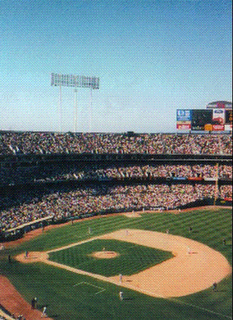Thursday, August 24, 2006
On Stadiums, Part 2

Going along with part one's "Bread and Circuses" theme of Roman origins, it must be remembered that stadiums were and still are a source of cheap entertainment for the masses. Only recently have sports seeked to limit greatly the number of people able to witness the sports first hand. All in the name of money...
Arco Arena in Sacramento has 17,317 seats. In the great majority of Kings contests in the 16 seasons in the Valley, every seat has been sold. While it is true that for a number of the sell-outs, the organization had to give away thousands of tickets to call it one, there is no disputing that Sacramento residents have supported the professional team with attendance about which other league teams could only dream. With that kind of support, and with the owners calling for a modernized facility to be a word class basketball arena, it would only figure that the new arena would accommodate a greater number of people. This of course must be the driving reason behind the arena drive in Sacramento.
This couldn't be further from the truth. The number of seats in Arco are not the reason a new arena is needed. Even though journalists and league officials have long pointed out that the Kings play in one of the smallest NBA arenas, the new arena will only hold "around 18,000 seats" according to recent Maloof statements. Huh? Furthermore, the new arena will have a great many more "luxury suites" than the 30 Arco has, meaning the average fan will potentially have fewer chances to see the Kings, depending on the final arena configuration. Luxury Suites tend to be rented out to corporations, or in the case of the Capital City--politicians and lobbyists.
To say the current arena has been populated by the "average fan" is a bit naive. The average Kings fan cannot afford a season ticket. While the cheapest ticket to a game is $10, those are very limited. They then jump to over $25. Most Kings fans cannot go to more than a couple of games a year. With the scarcity taken into consideration, many fans content themselves with watching on TV or listening to the radio.
It is the scarcity that causes ticket prices to rise. The NFL learned that, going to enormous lengths to pressure the populace to attend in person. If a game is not sold out, it will not be televised locally. Some teams, including the Chargers and Raiders in California, have agreements with the local governments to make up the difference if tickets are not sold. Cities pay for the privilege of hosting a team, which provides a national/international identity for the city as well as a source of pride for residents.

The Oakland Athletics have tried to create scarcity in the huge football/baseball McAfee Coliseum by closing the top of the stadium. Although the A's sometimes held mega-attended games of up to 55,000, the norm was more like 24,000 widely spaced throughout a 40,000 seat bowl (overflow crowds used to be seated high on Mt. Davis, the football structure). The A's are drawing less than last year, but say the cash-flow is better.
It is all about the cash. Owners need to pay their players and other employees an increasing amount each year, while they also hope to earn an annually increasing profit off their investments. That is the business end of professional sports. These sports are also civic institutions often thought of in a different way than other businesses. Major League Baseball is exempt from anti-trust rules, and is often checked on by Congress. Cities and states build stadiums for teams, and allow very generous terms for the facility's use.
It is sad to see the widening gulf between sports and the masses. Gone are the days an A's fan could go to a Wednesday game and enjoy nine hotdogs for a total of ten bucks, and that was only a few years ago. Calling to mind the sports organization's debt to the public, costs should be kept down and opportunities for attendance must continue to be given to the poorest of the team's fanbase. Not only is it better for the team to have a larger fan base, it should also be considered a duty for drinking out of the public trough. If the Kings get a new arena in downtown Sacramento, they must remember it is because the public voted and paid for it. It may be too much to ask for the Kings to build the largest arena in the country, but a nod to public access should be made in the design of the building.
